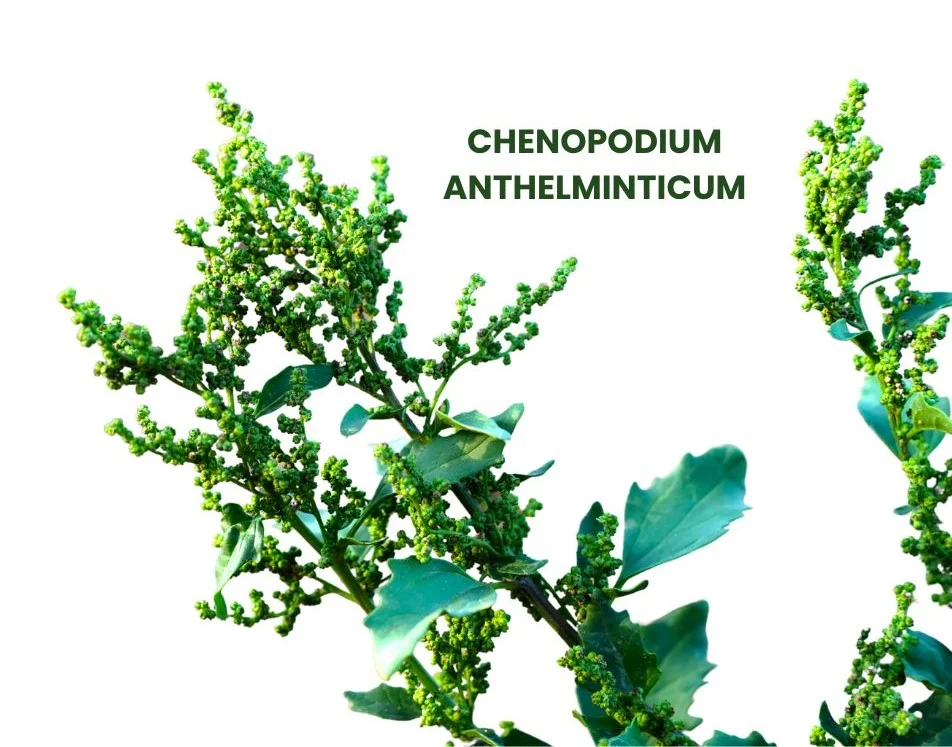Chenopodium anthelminticum, commonly known as Jerusalem Oak, is a medicinal plant belonging to the Chenopodiaceae family.
It has a long history of use in traditional medicine, particularly for its anthelmintic properties, meaning it is effective against parasitic worms.

Table of Contents
ToggleSOURCE INFORMATION
Scientific Classification
- Kingdom: Plantae
- Order: Caryophyllales
- Family: Chenopodiaceae
- Genus: Chenopodium
- Species: Chenopodium anthelminticum
Origin
JERUSALEM Oak is native to North America and is found in various regions across the continent.
It grows in dry, sandy soils and is often cultivated for its medicinal uses.
Interesting Facts
- Jerusalem Oak has been used for centuries by indigenous peoples of North America for its medicinal properties.
- The plant’s seeds and leaves are traditionally used to prepare herbal remedies for various ailments, particularly as an anthelmintic to expel parasitic worms from the body.
- In addition to its medicinal uses, Jerusalem Oak is also sometimes used as a culinary herb in certain cultures.
Homoeopathic preparation
- The homeopathic remedy Chenopodium anthelminticum is prepared from the seeds of the Jerusalem Oak plant.
- The seeds are collected and undergo a process of potentization according to homeopathic principles, which involves dilution and succussion to extract and enhance their medicinal properties.
DRUG PATHOGENESIS
- Chenopodium anthelminticum acts primarily on the nervous system, particularly affecting the auditory nerves and the brain.
- It is indicated for symptoms of apoplexy, right hemiplegia, aphasia, and vertigo.
- The remedy also has a marked effect on the auditory system, with symptoms such as torpor of the auditory nerve, buzzing in the ears, and enlargement of tonsils.
KEY CHARACTERISTICS
- Characteristic pain between the angle of the right shoulder-blade near the spine and through the chest.
- Symptoms of apoplexy, right hemiplegia, and aphasia.
- Stertorous breathing, sudden vertigo, and Meniere’s disease may be present.
- Affections of the auditory nerves, with hearing better for high-pitched sounds and comparative deafness to the sound of the voice.
PARTICULAR ORGAN SYMPTOMS
EARS
- Torpor of auditory nerve: A sluggishness or dullness of the auditory nerve, leading to decreased sensitivity to sound.
- Hearing better for high-pitched sounds: Improved hearing for sounds with a higher frequency.
- Comparative deafness to sound of voice: Difficulty hearing speech compared to other sounds.
- Great sensitiveness to sound, as of passing vehicles: Heightened sensitivity to certain loud noises, such as vehicles passing by.
- Shrinking from low tones: Averse or uncomfortable response to low-pitched sounds.
- Buzzing in ears: Perception of a buzzing or ringing sound in the ears, known as tinnitus.
- Enlargement of tonsils: Swelling or hypertrophy of the tonsils, lymphoid tissues located at the back of the throat.
- Aural vertigo: Sensation of dizziness or spinning associated with disturbances in the auditory system.
BACK
- Severe pain extending from the area between the right shoulder blade and the spine, radiating through the chest.
URINE
- Copious, yellow, foaming urine: Abundant urine that is yellow in color and produces foam, indicating possible urinary tract irritation.
- Acrid sensation in urethra: Burning or stinging feeling in the urethra, the tube that carries urine from the bladder.
- Yellowish sediment: Deposits of yellowish material in the urine, which may indicate the presence of certain substances or conditions.
MODALITIES
- Aggravation: Symptoms may worsen with sudden movements or changes in position.
- Amelioration: Relief may be experienced with rest and quiet.
WHAT ARE MODALITIES IN HOMOEOPATHY?
RELATIONSHIP WITH OTHER DRUGS
- Compare with Opium, China, and Chelidonium.
DOSE
- Third potency is typically used for Chenopodium anthelminticum.
- Oil of Chenopodium is used for hookworm infestations, with 10 minim doses every 2 hours for 3 doses.
Frequently Asked Questions
What is Jerusalem Oak commonly used for?
- Jerusalem Oak is traditionally used as an anthelmintic to expel parasitic worms from the body.
How is Chenopodium anthelminticum prepared as a homeopathic remedy?
- The remedy is prepared from the seeds of the Jerusalem Oak plant using a process of potentization according to homeopathic principles.
What are the key symptoms indicating the use of Chenopodium anthelminticum?
- Key symptoms include characteristic pain in the scapula, symptoms of apoplexy, right hemiplegia, aphasia, vertigo, and affections of the auditory nerves.
What is the dosage for Oil of Chenopodium for hookworm infestations?
- The dosage is 10 minim doses every 2 hours for 3 doses.
Meaning of Difficult
- Anthelmintic: A substance that expels or destroys parasitic worms.
- Aphasia: Loss of ability to understand or express speech.
- Stertorous: Characterized by a heavy, snoring sound.
